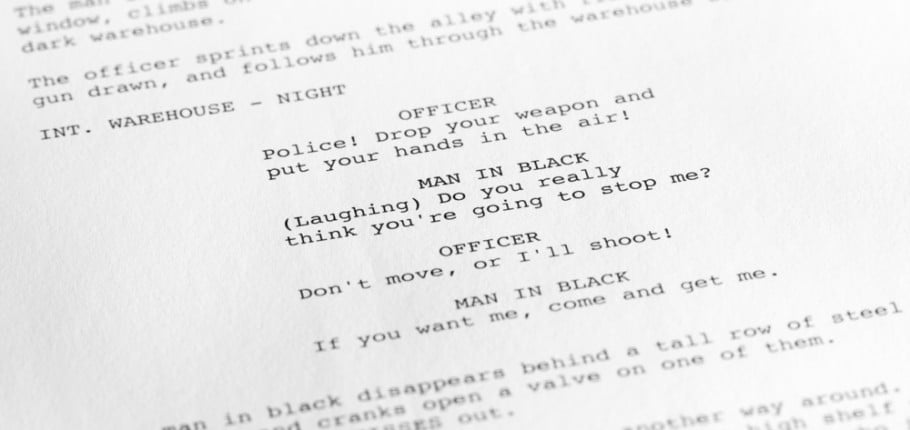
4 Mistakes Every Screenwriting Rookie Makes
It’s very hard to write a great script. But a good script? You can do that. For sure! This column will explore the ins and outs of proper screenwriting. There’s a lot to go over, but let’s start with some rookie mistakes. Avoid making these simple mistakes, unless you want to turn your reader into an eye-roller:
# 1 Don’t Write Humongous Blocks of Text
Keep your scene descriptions short and sweet. Go long only when absolutely necessary.
INT. BATHROOM – NIGHT
JOE SMITH, 24, walks into the darkened bathroom. He flips the light switch, flooding the room with illumination. He blinks as he adjusts to the sudden brightness. He scratches his chest as he takes uncertain strides toward the sink. His feet slightly stick to the glossy floor tiles, but the inconvenience doesn’t slow his progress. When he reaches his destination, his hand moves to his armpit to handle another itch. Joe yawns and holds his mouth open longer than he should. He gazes into the mirror and studies his reflection. There are bags under his eyes that almost droop down to his untamed beard. Specks of food are visible in his facial hair, but Joe doesn’t care. He squeezes a tube of toothpaste onto his toothbrush, then plunges the toothbrush into his mouth. He moves the brush across his teeth – upper teeth first, then the bottoms. He moves his tongue around his mouth to accommodate the toothbrush. Joe hums to himself as he turns on the faucet. Water gushes out and flows down into the sink’s drain. Joe cups his hand under the faucet in order to gather water. He raises the water to his mouth and sucks it in. He swishes the mixture of sink water and toothpaste residue around before finally spitting everything out into the sink. Joe looks back in the mirror. There’s some leftover goop on his lips. He wipes it away with the back of his hand, then drops his toothbrush in the sink.
# 2 Don’t Give Characters Similar Names
That’ll lead to unnecessary confusion and abandoned readings. Since you’re probably not going to write a movie with more than twenty-six prominent characters, just make sure everyone’s name starts with a different letter.
GARY
Did you like the movie, Greg?
GREG
I loved it! What did you think, Gary?
GARY
Oh, yeah. It’s my favorite movie of the year!
GLEN
You guys are way wrong!
GREG
Who are you?
GLEN
I’m Glen.
GALE
And I’m Gale.
GREG
Well, I’m Greg. And this is Gary.
GARY
Hello.
# 3 Don’t Put Camera Directions in Your Script
There are other people who are paid to figure that stuff out, and they won’t appreciate you overstepping your boundaries. Just concentrate on telling the best possible story.
EXT. DESERT – DAY
THE CAMERA surveys the barren landscape. It swoops over the sand until it settles on JERRY DELGADO, 37. As he walks, THE CAMERA keeps him in a MEDIUM CLOSE-UP.
# 4 Don’t End your Story as a Sequel
Back to the Future ends with a “To Be Continued” but that was added to the home video release after the film became a hit. Worry about your sequel if/when your movie is successful. Only smug jerks end their projects expecting a continuation. End your story this way and it’s a total let-down for the reader.
DRAKE CARTER
Uh oh! How are we going to get out of this one?!
TO BE CONTINUED IN DRAKE CARTER 2!
That’s all for now. To be continued!
What topics would you like us to discuss in the future? Let us know in the comments below!
Learn more about studying screenwriting with a working, professional screenwriter at filmconnection.com.



